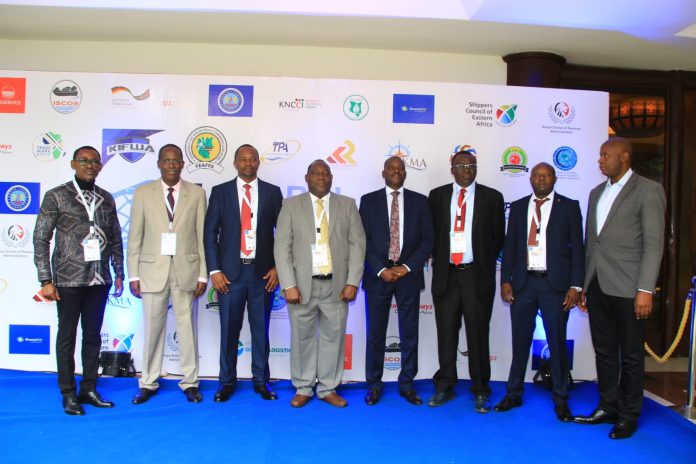Somali Magazine – Over 15 countries attended the 4th Global Logistics Convention, that aims to end the numerous non-tariff barriers and bottlenecks affecting the supply chain in Africa. The conference that was hosted by the Kenya International Freight and Warehousing Association (KIFWA) was the first of its kind, looking to introduce policies that will positively impact cargo clearance in the country through cost reduction in doing business as well as reducing the cost of imported goods across East Africa.
“We are hosting global logistics, and this is the first logistics conference that has been held by KIFWA in this country, and it is one of the successful conferences that KIFWA has held in the country with respect to the maritime industry,” said Roy Mwanthi, the National Chairman, Kenya International Freight and Warehousing Association.
With the theme Connecting Continents: Strengthening Global Supply Chains, the convention highlighted a number of key issues, including reflecting on how different players are harnessing the opportunities under the African Continental Free Trade Area (AfCFTA), focusing on the role of transport and logistics service providers in the enhancement of green logistics, enhancing channels of building networks and access to markets through Intratrade, and pinpointing the various financing and insurance solutions for both large and small logistics service providers, among other issues.
As a thorny issue that has affected logistics transportation to the EAC landlocked countries, fuel price hikes and heavy charges at the ship lines have slightly affected the income generation in cargo transportation, causing a lot of competitiveness in the northern corridor. Subsequently, the tax regulations have also reduced cargo imports into the country, as many importers are lamenting the high taxation imposed by the government.
“New taxes have sort of slowed down the importation of cargo into the country, and of course, when new tax policies are introduced, there is sort of friction, and so on the part of cargo transportation, we have seen a slight drop as we try to monitor how the new regime would have affected them.
“Generally, there has been an increase in diesel prices in Kenya, including arbitrary charges in the lines, that has further affected the northern corridor,” the chairman added.
Recently, Kenya has incurred massive losses after volumes of cargo docked at Dare Salaam port due to the fear of high charges at Mombasa port. However, the KIFWA chairman confidently confirmed that Kenya is on the right track in cargo efficiency and that in the next few months, it will pick up and the importation levels will go back to where they were or further improve to higher levels than before.
Unlike other countries in East Africa, Kenya is known for its efficiency in cargo handling and vessel return, hence improving intratrade.
For instance, Mombasa port, for the last one week, has had seven vessels awaiting in the line, with Dare Salaam and Durban ports burfing 30 and 70 vessels respectively. This has tentatively indicated that Kenya is doing immensily well in vessel and cargo handling.
Kenya is currently working on a long-term investment, looking to increase free trade within the continent in the next 10 years. The African states, however, aim to reduce up to 97% of the tariffs to zero, thus enabling different players to enter and trade in new markets.
“We need proper infrastructure and free movement of cargo to effect this. Most of our roads do not cross effectively into other countries in Africa. Our airlines do not have free-landing rights. We need to come together to improve intra-africa trade, remarked Mr. George Kidenda, Managing Director, Freightlogix Kenya.
Africa is facing challenges in network connectivity, causing minimal cargo handling for local airlines, with the greatest percentage handled by international cargo airlines. The UNCTA Report of 2021 confirmed that 90 per cent of freight cargo in Africa is handled by international cargo airlines, leaving only 10 percent to local airlines.
“One of the major challenges in Africa is the issue of uni-directional demand. Flights or sea freight vessels will go one direction full and come back empty, and this has the effect of increasing the unit price. All the elements of the liberalisation of trade will stimulate trade within the continent, and the more we have bidirectional movement of cargo, the prices will naturally come down,” said Peter Musola, Head of Kenya Airways Cargo, emphasising the need for liberalisation of trade in Africa.
Other key players and partners that collaborated with KIFWA include FEAFFA and various Kenyan government agencies like KPA and Kenya Railway Co-operation, among others. Others who participated in gaurrila logistics, including trade mark East Africa, the GIZ and Tanzania Ports Authority, and the Kenya National Chamber of Commerce—all of them partnered together to host the global logistics convention (GLC).
About the Global Logistics Convention
The Global Logistics Convention (GLC) is an annual freight logistics event of the Federation of East African Freight Forwarders Associations (FEAFFA). The Convention was held successfully first in Tanzania in 2017, in Kampala, Uganda, in 2018, and in Kigali, Rwanda, in 2019.
The three-day (November 22–24) conference is however expected to end on Friday.

